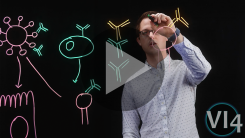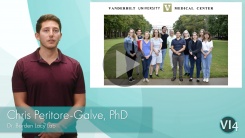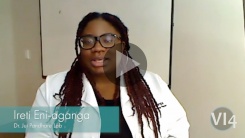VI4 Research Spotlight is where you can find the latest news and happenings at the Vanderbilt Institute for Infection, Immunology, and Inflammation.
Postdoc Spotlight: Seth Zost, PhD
VI4 Curation Team
April 15, 2022
Seth graduated from the University of Pennsylvania in 2013 with a B.A. in Biochemistry and History and a M.S. in Chemistry. Following graduation, Seth joined the lab of Dr. Scott Hensley at the University of Pennsylvania and studied human antibody responses to influenza A viruses and the viral evasion of pre-existing immunity. Seth defended his PhD in 2018. In the lab, Seth is continuing to study antibody responses against respiratory viruses with special interests in defining conserved sites on viral proteins that are targeted by human antibodies and identifying how prior exposure shapes human antibody responses against viruses like influenza and SARS-CoV-2....Click the image on the left to continue reading.
Faculty Spotlight: Jane F. Ferguson, Ph.D.
VI4 Curation Team
February 9, 2022
Dr. Ferguson completed a BA in Human Genetics at Trinity College Dublin, and a PhD in Nutrigenomics at University College Dublin, Ireland, before moving to Philadelphia for postdoctoral training in Cardiovascular Genomics at the University of Pennsylvania. She moved to Nashville to join the faculty at Vanderbilt in October 2014... Click Dr. Ferguson's photo to continue reading.
Faculty Spotlight: Anna Patrick, M.D., Ph.D.
VI4 Curation Team
January 21, 2022
Dr. Patrick earned her Master's degree from the University of Pennsylvania, Biochemistry and Molecular Biophysics, and her M.D./Ph.D. from the University of Texas Southwestern Medical Center. She's an Assistant Professor of Pediatrics Rheumatology at Vanderbilt where her work focuses on identifying and characterizing pathogenic molecular pathways in juvenile idiopathic arthritis and pediatric autoimmune disease.... Click Dr. Patrick's photo to continue reading.
Trainee Spotlight: Lillian J. Brady, Ph.D. & Kirsty Erickson
VI4 Curation Team
December 2, 2021
Lillian Brady, Ph.D. and Kirsty Erickson are part of the Erin Calipari Lab at Vanderbilt University in the Department of Pharmacology.
Lillian obtained her PhD from the University of Alabama at Birmingham (UAB) in the Department of Neurobiology. While at UAB, Lillian worked with Dr. Lynn Dobrunz where she studied the role of the dopamine system in the modulation and regulation of inhibitory synaptic transmission and neural circuit function within the hippocampus. Lillian joined Vanderbilt University as an Academic Pathways Postdoctoral Research Fellow in May of 2017 where her research interests include understanding the synaptic physiology, circuit function, and molecular mechanisms that underlie different types of learning behavior.
Kirsty graduated from the University of South Dakota in 2016 with a BS in Medical Biology, during which time she studied the role of Ubiquilin-1 in learning and memory. Kirsty came to Vanderbilt in 2017 as a research assistant in the Neul lab, where she investigated the pathogenesis of Rett Syndrome. Now, she joins the Calipari Lab as a graduate student interested in terminal dopamine dynamics that render susceptibility to stimulant use disorder... Click the image on the left to continue reading.
Postdoc Spotlight: Heather Caslin, Ph.D.
VI4 Curation Team
October 19, 2021
Heather Caslin is a postdoctoral researcher in the Alyssa Hasty lab at Vanderbilt University in the Department of Molecular Physiology and Biophysics. She received her Ph.D. from Virginia Commonwealth University. She studies how macrophages and mast cells contribute to weight cycling accelerated metabolic disease. Heather is also passionate about teaching, mentorship, and outreach, and she has worked with the Collaborative for STEM Outreach and Education at Vanderbilt University, has volunteered with the organization Black in Immuno, and does science communication via Instagram!... Click the image on the left to continue reading.
Postdoc Spotlight: Chris Peritore-Galve, Ph.D.
VI4 Curation Team
October 4, 2021
Chris Peritore-Galve is a postdoctoral researcher in the Borden Lacy Lab at the Vanderbilt University Medical Center in the department of Pathology, Microbiology and Immunology. He received his PhD from Cornell University. His work is on understanding the role of Clostridioides difficile toxins during infection. .... Click the image on the left to continue reading.
Faculty Spotlight: Chandravanu Dash, Ph.D.
VI4 Curation Team
August 3, 2021
Dr. Dash is a faculty member in the Meharry Medical College Center for AIDS Health Disparities Research (CAHDR) and the Department of Biochemistry, Cancer Biology, Pharmacology and Neuroscience. His research focuses on understanding the mechanisms of HIV-1 infection and probing the effects of drugs of abuse on HIV pathogenesis.
Graduate Student Spotlight: Ireti Eni-aganga
VI4 Curation Team
July 22, 2021
Ireti Eni-aganga received her Bachelor of Science in Biochemistry from Arizona State University in 2014. She's currently a PhD candidate at Meharry Medical College in the laboratory of Dr. Jui Pandhare. Her work is part of the Center for AIDS Health Disparities Research (CAHDR)... Click the image on the left to continue reading.
Faculty Spotlight: Matt Alexander, M.D., Ph.D.
VI4 Curation Team
July 9, 2021
Dr. Alexander earned his undergraduate degree from Duke University and his M.D./Ph.D. from the University of Virginia School of Medicine. He's an Assistant Professor of Medicine and Molecular Physiology & Biophysics at Vanderbilt researching the role of adaptive immunity in the pathogenesis of hypertension and associated cardiovascular disease... Click Dr. Alexander's photo to continue reading.
Graduate Student Spotlight: Nicolas Gray Shealy
VI4 Curation Team
June 29, 2021
Nicolas grew up in Columbia, SC and attended the College of Charleston. After graduating in 2018, he participated in a post-baccalaureate experience program (PREP) at the Medical University of South Carolina, working in the lab of Amy D. Bradshaw Ph.D. He came to Vanderbilt University in the fall of 2019 via Interdisciplinary Graduate Program and ultimately joined the lab of Mariana Byndloss D.V.M, Ph.D. His thesis project is centered around understanding the mechanisms bacterial pathogens use to take full advantage both of the human host and the gut microbiota. He is specifically looking into the metabolism of short-chain fatty acids and amino acids... Click the image on the left to continue reading.









